[初一英语]仁爱初一英语复习资料
- 格式:doc
- 大小:278.00 KB
- 文档页数:39
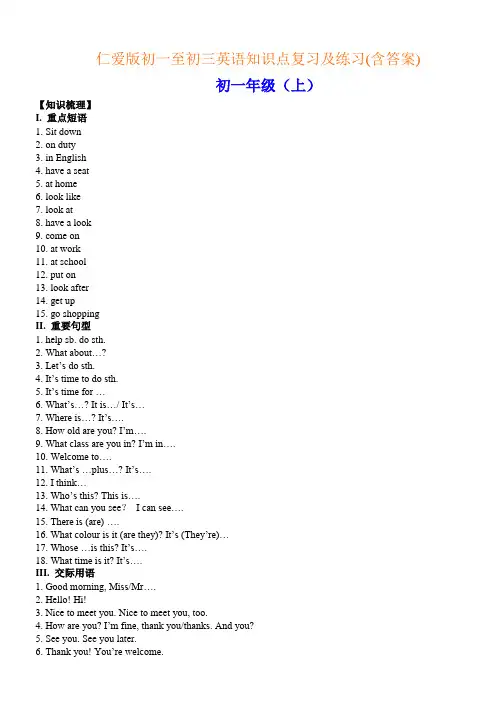
仁爱版初一至初三英语知识点复习及练习(含答案)初一年级(上)【知识梳理】I. 重点短语1. Sit down2. on duty3. in English4. have a seat5. at home6. look like7. look at8. have a look9. come on10. at work11. at school12. put on13. look after14. get up15. go shoppingII. 重要句型1. help sb. do sth.2. What about…?3. Let’s do sth.4. It’s time to do sth.5. It’s time for …6. What’s…? It is…/ It’s…7. Where is…? It’s….8. How old are you? I’m….9. What class are you in? I’m in….10. Welcome to….11. What’s …plus…? It’s….12. I think…13. Who’s this? This is….14. What can you see?I can see….15. There is (are) ….16. What colour is it (are they)? It’s (They’re)…17. Whose …is this? It’s….18. What time is it? It’s….III. 交际用语1. Good morning, Miss/Mr….2. Hello! Hi!3. Nice to meet you. Nice to meet you, too.4. How are you? I’m fine, thank you/thanks. And you?5. See you. See you later.6. Thank you! You’re welcome.7. Goodbye! Bye!8. What’s your name? My name is ….9. Here you are. This way, please.10. Who’s on duty today?11. Let’s do.12. Let me see.IV. 重要语法1. 动词be的用法;2. 人称代词和物主代词的用法;3. 名词的单复数和所有格的用法;4. 冠词的基本用法;5. There be句型的用法。
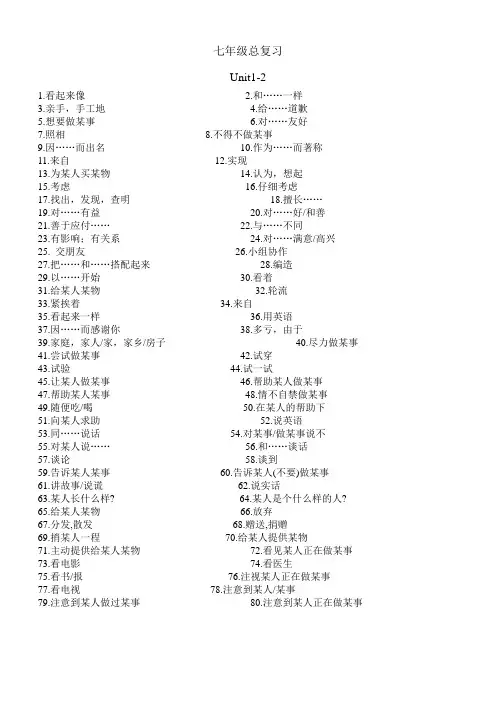
七年级总复习Unit1-21.看起来像________________________________2.和……一样_______________________3.亲手,手工地_____________________________4.给……道歉______________________5.想要做某事_______________________________6.对……友好______________________7.照相____________________________8.不得不做某事________________________9.因……而出名___________________________10.作为……而著称_______________________ 11.来自_____________________________12.实现_____________________________13.为某人买某物__________________________14.认为,想起______________________15.考虑___________________________________16.仔细考虑_________________________17.找出,发现,查明____________________________18.擅长……__________________19.对……有益______________________________20.对……好/和善__________________21.善于应付……__________________________22.与……不同_____________________23.有影响;有关系__________________________24.对……满意/高兴_________________25.交朋友______________________________26.小组协作_________________________27.把……和……搭配起来______________________28.编造_________________________29.以……开始____________________________30.看着____________________________31.给某人某物_______________________________32.轮流________________________33.紧挨着____________________________34.来自____________________________35.看起来一样______________________________36.用英语______________________37.因……而感谢你________________________38.多亏,由于________________________39.家庭,家人/家,家乡/房子__________________________40.尽力做某事____________________ 41.尝试做某事____________________________42.试穿____________________43.试验________________________________44.试一试_________________________________ 45.让某人做某事__________________________46.帮助某人做某事_________________________ 47.帮助某人某事___________________________48.情不自禁做某事________________________ 49.随便吃/喝______________________________50.在某人的帮助下_________________________ 51.向某人求助________________________________52.说英语_____________________________ 53.同……说话__________________________54.对某事/做某事说不_________________________ 55.对某人说……___________________________56.和……谈话____________________________ 57.谈论___________________________________58.谈到__________________________________ 59.告诉某人某事______________________60.告诉某人(不要)做某事________________________ 61.讲故事/说谎___________________________62.说实话_________________________________ 63.某人长什么样?_________________________64.某人是个什么样的人?_____________________ 65.给某人某物____________________________66.放弃___________________________________ 67.分发,散发____________________________68.赠送,捐赠_______________________________ 69.捎某人一程_________________________70.给某人提供某物_____________________________ 71.主动提供给某人某物______________________72.看见某人正在做某事____________________ 73.看电影__________________________________74.看医生_______________________________ 75.看书/报_____________________________76.注视某人正在做某事________________________ 77.看电视__________________________78.注意到某人/某事_______________________________ 79.注意到某人做过某事______________________80.注意到某人正在做某事__________________七年级总复习(Unit3-4)1.命令某人做某事________________________________2.点餐_______________________3.使……井然有序_____________________________4.出故障______________________5.各种各样的_______________________________6.刚才______________________7.去野餐____________________________8.随着时间的流逝________________________9.半小时___________________________10.讲故事_________________11.住在(某地)_________________________12.和……住在一起_____________________________ 13.驱车离开__________________________14.开车去某地______________________15.教某人做某事___________________________________16.照相______________________17.关心,照顾____________________________18.出去吃饭__________________19.吃光,吃完______________________________20.出去;熄灭__________________21.上升;(旗)升起__________________________22.为……做好准备_____________________ 23.(与……)取得联系__________________________24.唱歌_________________26.放风筝______________________________26.释放,解散_____________________27.在某人空闲时______________________28.回家_____________________29.在家____________________________30.算出,制定;完成____________________________ 31.出现_______________________________32.(领某人)参观________________________33.和……玩__________________________34.在……中扮演角色____________________________ 35.爱上(某人)______________________________36.了解___________________37.寻求帮助________________________38.试一试________________________39.等待__________________________40.期待_______________________________41.试穿____________________________42.去购物/钓鱼___________________________43.回电话________________________________44.做作业_________________________________ 45.起床__________________________46.使用,利用_________________________47.写下,记下____________________48.告诉某人一些关于……的事情________________________ 49.在……初______________________________50.在回家的路上_________________________ 51.收益匪浅___________________________52.根本不,一点也不_____________________________ 53.彼此,互相__________________________54.玩的开心_________________________55.向某人展示某物___________________________56.随身携带____________________________ 57.是时候做某事了________________________58.请你(不要)做某事好吗?___________________ 59.没问题______________________60.解决问题________________________61.一点儿/几乎没有________________________62.一些/几乎没有__________________________63.询问职业的句型_________________________________________________________________64.询问“希望将来/长大后从事什么职业”的句型_______________________________________65.提建议的句型:①_______________________________②________________________________③__________________________________________④_____________________________________ ⑤__________________________________________⑥______________________________________⑦____________________________________________66.n eed 的用法:(物作主语)___________________________________(人作主语)___________________________________67.(急)需要_______________________________68.满足……的需要________________________69.(某人)没有必要做某事____________________________________________70.询问价格的句型①_______________________________②________________________________③__________________________________________④_____________________________________71.你认为……怎么样?______________________________________________________________72.询问某人(关于)某事/物_________________________73.要求/请求做某事__________________ 74.请求某人(不要)做某事______________________75.请求(给予)某物____________________1.在操场上________________________________2.做游戏_______________________3.运动会_____________________________4.注意______________________________5.收集邮票_______________________________6.在夜晚______________________7.过着……生活____________________________8.追上,赶上________________________9.骑自行车___________________________10.搭乘,搭车___________________________11.让某人搭便车_____________________________12.以……开始___________________________ 13.在……的开始__________________________14.利用______________________15.与……交朋友________________________________16.追赶______________________17.逃跑____________________________18.用完,耗尽__________________19.坐下______________________________20.写下___________________________21.从……中学习__________________________22.学习做某事_____________________23.做某事对某人很难__________________________24.做某事有困难_________________________ 27.去游泳______________________________26.画画_____________________27.拟定,起草______________________28.踢足球/打篮球_____________________29.看电影____________________________30.去睡觉____________________________31.在某人的空闲时间_____________________________32.听音乐________________________ 33.做卡片____________________________34.打扫卫生____________________________35.寻找______________________________36.写信__________________________37.准时________________________38.在……后面________________________39.吃午饭__________________________40.领某人参观某地____________________41.从……到……____________________________42.最好做某事____________________43.晚饭后______________________44.笨鸟先飞__________________________________________45.频度副词按频率大小排序_________________________________________________________46.步行去某地_________________________=_______________________________47.骑车去某地__________________________=_____________________________________48.乘公共汽车/地铁/火车去某地_______________________________________________________49.乘飞机去某地_____________________=____________________________50.开车去某地_________________________=_____________________________51.从陆地/走水路/从海路/乘飞机_______________________________________________________52.骑自行车/乘公共汽车/乘火车/乘船/乘飞机_____________________________________________53.乘小车_________________=_____________________54.该是(某人)做某事的时间了______________________________________________________55.第(某人)第几次做某事_________________________56.听……____________________________ 57.听到某人做了某事______________________58.听到某人正在做某事_______________________ 59.听起来像______________________60.向某人借某物________________________61.把某物借给某人___________________________62.借多久用______可与________________连用63.让某人一直做某事______________________64.继续做某事_____________________65.使某人/某物……____________________66.阻止某人做某事_____________________________1.直到……才……________________________________2.在公共场合_______________________3.在……中心_____________________________4.处在危险中______________________5.将……收起_______________________________6.伸出;扑灭,熄灭______________________7.失去生命____________________________8.失去信心________________________9.沉迷于……___________________________10.保持安全___________________________11.上床睡觉_____________________________12.睡着___________________________13.受伤__________________________14.加速______________________15.在不久的将来________________________________16.照顾______________________17.存钱____________________________18.到达__________________________________19.右转/左转______________________________20.过桥__________________________________ 21.换乘__________________________22.遵守交通规则_____________________23.过来(做某事)__________________________24.例如_________________________28.离……很远______________________________26.在……和……中间_____________________ 27.在……的尽头______________________28.在……对面_____________________29.在……拐角处___________________________30.在……附近____________________________ 31.在……前面(外部)_______________________32.在……前面(内部)________________________ 33.在前面____________________________34.cost__________________________________35.pay_________________________________36.spend_____________________________________ 37.take_________________________________38.打开________________________39.关闭__________________________40.调大(音量)____________________41.调小(音量)____________________________42.转身,掉头____________________43.返回,折回______________________44.上交,告发________________________________45.结果是,出席______________________46.轮流,替换_________________________47.轮流地__________________________48.穿过,越过________________________________49.停下正在做的事________________________=____________________________50.停下来去做某事_________________________=_____________________________51.阻止某人做某事___________________________52.做某事是……的________________________53.做某事对某人来说是……的_____________________________________54.某人这么做真是太……了__________________________________________1.计划做某事________________________________2.制定计划_______________________3.举办一场聚会_____________________________4.吹灭______________________5.被……绊倒_______________________________6.落后______________________7.看一下____________________________8.弹钢琴/吉他________________________________9.落下来___________________________10.回来___________________________11.在……岁时_____________________________12.过得愉快___________________________13.立刻,马上__________________________14.手工______________________15.也________________________________16.出生______________________17.带某人或某物去某地_______________________18.想要做某事____________________________ 19.计划某事/为某事做打算_______________________20.制定(做某事/某事)的计划___________ 21.害怕(做)某事__________________________22.害怕去做某事_____________________23.担心……;害怕……__________________________24.喜欢作某事_________________________ 25.玩的高兴______________________________26.喜欢某物_____________________27.忘记/遗憾要做某事______________________28.忘记/后悔做过某事_____________________ 29.把……带来___________________________30.把……带去____________________________ 31.搬运;拿;提_______________________32.拿来,取来________________________七年级总复习(Unit8)1.爬山________________________________2.充满……_______________________3.玩得开心_____________________________4.好运______________________5.相信自己_______________________________6.穿上______________________7.出去____________________________8.复苏________________________________9.开花,出版,发行___________________________10.去散步___________________________ 11.休息一下_____________________________12.一起___________________________13.远离__________________________14.用……装饰……______________________15.挂起________________________________16.熬夜______________________17.敲_______________________18.升起____________________________19.立即_______________________20.后来__________________________________21.全年__________________________22.名胜古迹_____________________23.压岁钱__________________________24.忙于做某事_________________________25.和……不同______________________________26.猜谜_____________________27.询问天气的句型:_________________________________________________28.穿着,带着_____________________29.穿上,带上___________________脱下_____________30.着装,打扮_________________穿衣服__________给自己穿衣服___________________31.最好(不要)做某事______________________32.忙于做某事_______________________33.忙于某事_____________________________________ 34.对(做)某事/物感兴趣_____________________35.对(做)某事/物失去兴趣__________________ 36.名胜古迹______________________________37.有趣的/感兴趣的__________________________ 38.对……感到兴奋____________________________39.对……感到惊奇____________________ 40.对……感到满意__________________________41.对……感到厌烦________________________ 42.对……感到担心______________________43.为(某人/某物)准备某事_____________________ 44.为某事做准备__________________________45.准备要做某事____________________________46.决定(不)做某事___________________________________________________47.决定(做)某事__________________________________48.决定……___________________ 49.决定……___________________________50.下定决心做某事________________________51.孤独的;寂寞的_____________________独自,单独________________。

仁爱英语七年级Unit 1 复习纲要与配套练习本单元讲解要点一.词汇部分(一)背诵短语1. be from 2.Good morning/afternoon/evening.3.thank you 4.in English (二)理解短语 1 excuse me 2.welcome to(三)常用短语1. stand up 2.sit down 3.telephone number 4.years old 5.in the same grade 二.语法部分学习be动词am,is,are的用法及一般疑问句和几种特殊疑问句(1)I 与am用,第三人称单数用is, we, you,they 和复数名词用are(2)一般疑问句要注意的问题:句中有be动词,把be 动词提前,肯定句中的I,my,we,our相应地改为you,your,you,your .三.句型部分1.Welcome to China. Thank you.2.Nice to meet you. Nice to meet you,too.3.Where are you from? I’m from Can ada.4.Excuse me,what is this/that in English? It’s an orange/a car.5.What class are you in? I’m in Class Four,Grade Seven.6.How old is she? She is fourteen.7.Are these/those cars? Yes, they are./No, they aren’t.本话题随堂练习I.单项选择(10题每小题2分满分20分)( )1.—How do you do?--A.How are you ?B. How do you do?C.Fine, thank you.( )2. What’s that in English?________A.This is a book.B.It’s a book.C.That’s a book.( )3. ________is your friend? Jim.A.WhatB.WhereC.Who( )4. What class Maria and Jane in? Maria is in Class One and Janein Class Two.A.are;areB.are;isC.is;is( )5. do you spell “book”? B- O-K,book.A.What;twoB.How,twoC.How;double( )6. Is this car ?Yes.It’s English car.A.a ;anB.a ;aC.an ; an( )7.Excuse me, you Joe? No,I’m not.A. isB. AreC.are( )8.Kate is English .A.an B.a C./( )9.Linder is fifteen old.She is my friend.A. a yearB. yearC.years( )10. are you? I’m thirteen years old.A.How oldB.WhereC.WhoII. 词汇运用(每小题2分,满分20分)(1 )根据句意及首字母提示补全单词。
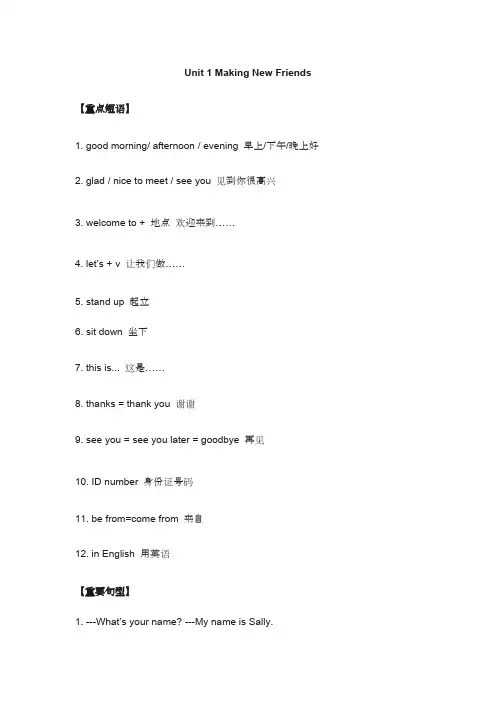
Unit 1 Making New Friends 【重点短语】1. good morning/ afternoon / evening 早上/下午/晚上好2. glad / nice to meet / see you 见到你很高兴3. welcome to + 地点欢迎来到……4. let’s + v 让我们做……5. stand up 起立6. sit down 坐下7. this is... 这是……8. thanks = thank you 谢谢9. see you = see you later = goodbye 再见10. ID number 身份证号码11. be from=come from 来自12. in English 用英语【重要句型】1. ---What’s your name? ---My name is Sally.2. ---Where are you from? ---I’m from China.---Where do you come from? ---I come from China.3. ---Where is he/ she from? ---He/She is from Japan.4. ---What’s this/ that in English? --- It’s a/ an…5. ---What’re these/ those in English? ---They’re…6. ---How do you spell it? ---E-R-A-S-E-R, eraser.7. ---Can you spell it? ---Yes, M-A-P, map.8. —How old are you/ is he/ are they?—I’m/ He is/ They are eleven.9. —What’s yourtelephone number?—It’s 4567967.10. —What class/ grade are you in?—I’m in Class Ten, Grade Seven.(注意大小写)11. Good morning/ afternoon/ evening.12. —Hello!/Hi! —Hello!/Hi!13. —Nice/Glad to see/meet you. —Nice/Glad to see/meet you, too.14. —Welcome to China/my home. —Thanks.15. —How do you do? —How do you do?16. —How are you? —Fine, thank you. And you? —I’m OK.17. —See you then/ later. —See you.18. —Goodbye. —Bye.19. —Thank you. —You’re welcome./That’s OK./Not at all.【重点语法】大小写句首字母,人名,地名,称呼语,专有名词,星期的首字母要大写,引人注意。
![仁爱版七年级上册英语教材复习提纲[大全5篇]](https://uimg.taocdn.com/3ca7a887b1717fd5360cba1aa8114431b90d8ed1.webp)
仁爱版七年级上册英语教材复习提纲[大全5篇]第一篇:仁爱版七年级上册英语教材复习提纲人生,就要闯出一条路来!为了事业,为了奋斗的人生,尽管失去许多,但有失必有得!而得到的往往会比失去的更重要,它是人生的价值与意义。
学习英语也是为了更好地与人交流,最直接的影响就是学习成绩。
下面就是小编为大家梳理归纳的知识,希望大家能够喜欢。
仁爱版七年级上册英语教材复习提纲1.动词be(is,am,are)的用法我(I)用am,你(you)用are,is跟着他(he),她(she),它(it)。
单数名词用is,复数名词全用are。
变否定,更容易,be后not加上去。
变疑问,往前提,句末问号莫丢弃。
还有一条须注意,句首大写莫忘记。
2.this,that和it用法(1)this和that是指示代词,it是人称代词。
(2)距离说话人近的人或物用this, 距离说话人远的人或物用that。
如:This is a flower.这是一朵花。
(近处)That is a tree.那是一棵树。
(远处)(3)放在一起的两样东西,先说this, 后说that。
如:This is a pen.That is a pencil.这是一支钢笔。
那是一支铅笔。
(4)向别人介绍某人时说This is…, 不说That is…。
如:This is Helen.Helen, this is Tom.这是海伦,海伦,这是汤姆。
(5)This is 不能缩写, 而That is可以缩写。
如:This is a bike.That's a car.这是一辆自行车。
那是一辆轿车。
(6)打电话时,介绍自己用this, 询问对方用that。
如:—Hello!Is that Miss Green? 喂,是格林小姐吗?—Yes, this is.Who's that? 是的,我是,你是谁?注意:虽然汉语中使用“我”和“你”,但英语中打电话时绝不可以说:I am…, Are you…?/Who are you?(7)在回答this或that作主语的疑问句时, 要用it代替this或that。
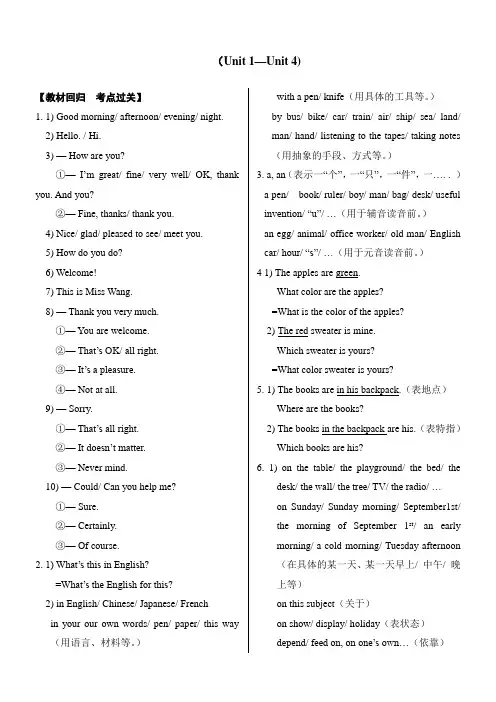
(Unit 1—Unit 4)【教材回归考点过关】1. 1) Good morning/ afternoon/ evening/ night.2) Hello. / Hi.3) — How are you?①—I’m great/ fine/ very well/ OK, thank you. And you?②— Fine, thanks/ thank you.4) Nice/ glad/ pleased to see/ meet you.5) How do you do?6) Welcome!7) This is Miss Wang.8) — Thank you very much.①— You are welcome.②—That’s OK/ all right.③—It’s a pleasure.④— Not at all.9) — Sorry.①—That’s all right.②—It doesn’t matter.③— Never mind.10) — Could/ Can you help me?①— Sure.②— Certainly.③— Of course.2. 1) What’s this in English?=What’s the English for this?2) in English/ Chinese/ Japanese/ Frenchin your our own words/ pen/ paper/ this way (用语言、材料等。
)with a pen/ knife(用具体的工具等。
)by bus/ bike/ car/ train/ air/ ship/ sea/ land/ man/ hand/ listening to the tapes/ taking notes (用抽象的手段、方式等。
)3. a, an(表示一“个”,一“只”,一“件”,一…. . )a pen/ book/ ruler/ boy/ man/ bag/ desk/ useful invention/ “u”/ …(用于辅音读音前。
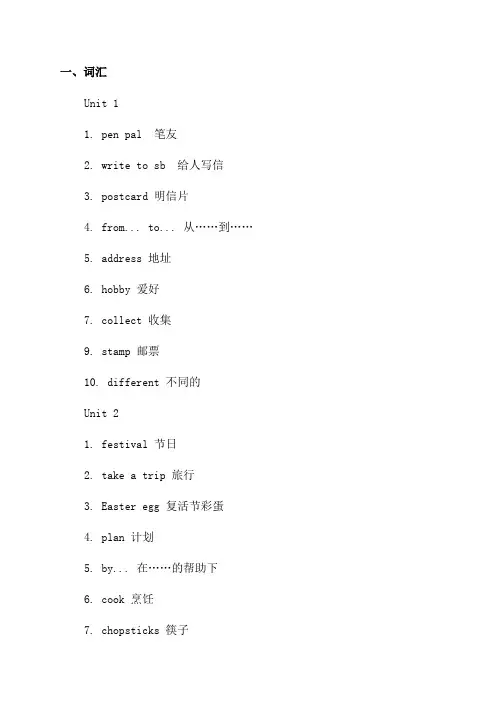
一、词汇Unit 11. pen pal 笔友2. write to sb 给人写信3. postcard 明信片4. from... to... 从……到……5. address 地址6. hobby 爱好7. collect 收集9. stamp 邮票10. different 不同的Unit 21. festival 节日2. take a trip 旅行3. Easter egg 复活节彩蛋4. plan 计划5. by... 在……的帮助下6. cook 烹饪7. chopsticks 筷子8. mooncake 月饼9. get together 聚会10. enjoy 享受Unit 31. have a party 聚会2. wear 穿着3. costume 装束4. decide 决定5. join 参加6. neighborhood 附近的7. celebrate 庆祝8. invitation 请柬9. even 即使10. goal 目标Unit 41. invention 发明2. kingdom 王国3. ancient 古代的4. famous 著名的5. iron 铁6. agriculture 农业7. Mongolian 蒙古人8. ruler 统治者9. wall 长城10. invent 发明Unit 51. canoe 小船2. voyage 航行3. voyageur 内陆探险家4. Canada 加拿大5. track 轨道6. explore 探索7. Oregon 俄勒冈8. expedition 探险9. continue 继续10. discover 发现Unit 61. examine 检查2. hurt 伤害3. symptom 症状4. treat 治疗5. cause 引起6. infection 感染7. prevent 防止8. medicine 药物9. vaccine 疫苗10. hospital 医院二、重点句子Unit 11. What's your hobby? 你有什么爱好?2. I like collecting stamps. 我喜欢收集邮票。
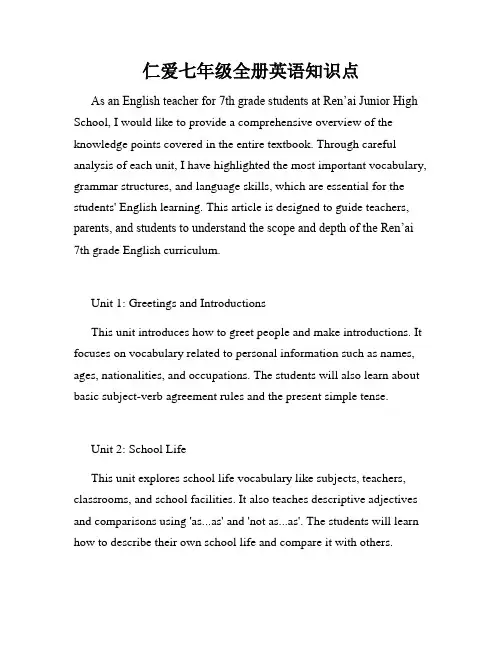
仁爱七年级全册英语知识点As an English teacher for 7th grade students at Ren’ai Junior High School, I would like to provide a comprehensive overview of the knowledge points covered in the entire textbook. Through careful analysis of each unit, I have highlighted the most important vocabulary, grammar structures, and language skills, which are essential for the students' English learning. This article is designed to guide teachers, parents, and students to understand the scope and depth of the Ren’ai 7th grade English curriculum.Unit 1: Greetings and IntroductionsThis unit introduces how to greet people and make introductions. It focuses on vocabulary related to personal information such as names, ages, nationalities, and occupations. The students will also learn about basic subject-verb agreement rules and the present simple tense.Unit 2: School LifeThis unit explores school life vocabulary like subjects, teachers, classrooms, and school facilities. It also teaches descriptive adjectives and comparisons using 'as...as' and 'not as...as'. The students will learn how to describe their own school life and compare it with others.Unit 3: Family and FriendsThis unit teaches vocabulary related to family members and friendships. Students will learn how to ask and answer questions about their family members and describe their personalities. They will also learn how to use possessive adjectives and pronouns correctly.Unit 4: Hobbies and InterestsThis unit introduces different hobbies and interests. Students will learn vocabulary related to leisure activities like sports, music, and arts. The unit focuses on using the present continuous tense to talk about what people are doing at the moment.Unit 5: Food and DrinkThis unit explores food and drink-related vocabulary. Students will learn how to order food in a restaurant, express likes and dislikes, and describe food. They will also learn how to use countable and uncountable nouns correctly.Unit 6: TravelThis unit teaches travel-related vocabulary and grammar. Students will learn how to plan a trip, ask for directions, and book a hotel. The unit covers the present continuous tense and 'going to' future tense.Unit 7: Health and FitnessThis unit introduces health and fitness-related vocabulary. Students will learn how to describe symptoms of sickness and give advice on how to stay healthy. The unit covers modal verbs like 'should', 'can', and 'must' in their practical uses.Unit 8: Festivals and CelebrationsThis unit explores cultural festivals and celebrations around the world. Students will learn vocabulary related to different festivals and the customs and traditions of each. The unit focuses on using different tense structures to describe past and future events.In conclusion, the Ren'ai 7th grade English textbook covers a wide range of essential vocabulary, grammar structures, and language skills. Through careful study and practice in each unit, the students will master the necessary English knowledge points for effective communication. As a teacher, I believe that the curriculum is well-organized and practical, giving students a solid foundation in English learning to help them achieve success in their future studies and daily life.。
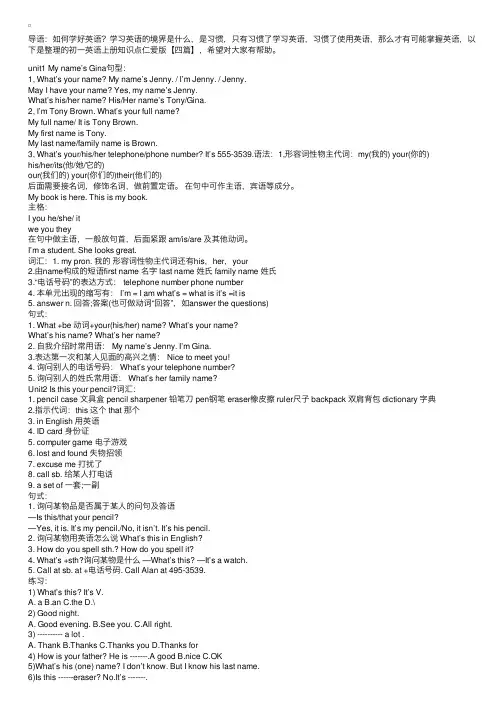
导语:如何学好英语?学习英语的境界是什么,是习惯,只有习惯了学习英语,习惯了使⽤英语,那么才有可能掌握英语,以下是整理的初⼀英语上册知识点仁爱版【四篇】,希望对⼤家有帮助。
unit1 My name’s Gina句型:1, What’s your name? My name’s Jenny. / I’m Jenny. / Jenny.May I have your name? Yes, my name’s Jenny.What’s his/her name? His/Her name’s Tony/Gina.2, I’m Tony Brown. What’s your full name?My full name/ It is Tony Brown.My first name is Tony.My last name/family name is Brown.3, What’s your/his/her telephone/phone number? It’s 555-3539.语法:1,形容词性物主代词:my(我的) your(你的)his/her/its(他/她/它的)our(我们的) your(你们的)their(他们的)后⾯需要接名词,修饰名词,做前置定语。
在句中可作主语,宾语等成分。
My book is here. This is my book.主格:I you he/she/ itwe you they在句中做主语,⼀般放句⾸,后⾯紧跟 am/is/are 及其他动词。
I’m a student. She looks great.词汇:1. my pron. 我的形容词性物主代词还有his,her,your2.由name构成的短语first name 名字 last name 姓⽒ family name 姓⽒3.“电话号码”的表达⽅式: telephone number phone number4. 本单元出现的缩写有: I’m = I am what’s = what is it’s =it is5. answer n. 回答;答案(也可做动词“回答”,如answer the questions)句式:1. What +be 动词+your(his/her) name? What’s your name?What’s his name? What’s her name?2. ⾃我介绍时常⽤语: My name’s Jenny. I’m Gina.3.表达第⼀次和某⼈见⾯的⾼兴之情: Nice to meet you!4. 询问别⼈的电话号码: What’s your telephone number?5. 询问别⼈的姓⽒常⽤语: What’s her family name?Unit2 Is this your pencil?词汇:1. pencil case ⽂具盒 pencil sharpener 铅笔⼑ pen钢笔 eraser橡⽪擦 ruler尺⼦ backpack 双肩背包 dictionary 字典2.指⽰代词:this 这个 that 那个3. in English ⽤英语4. ID card ⾝份证5. computer game 电⼦游戏6. lost and found 失物招领7. excuse me 打扰了8. call sb. 给某⼈打电话9. a set of ⼀套;⼀副句式:1. 询问某物品是否属于某⼈的问句及答语—Is this/that your pencil?—Yes, it is. It’s my pencil./No, it isn’t. It’s his pencil.2. 询问某物⽤英语怎么说 What’s this in English?3. How do you spell sth.? How do you spell it?4. What’s +sth?询问某物是什么 —What’s this? —It’s a watch.5. Call at sb. at +电话号码. Call Alan at 495-3539.练习:1) What’s this? It’s V.A. aB.anC.theD.\2) Good night.A. Good evening.B.See you.C.All right.3) ---------- a lot .A. ThankB.ThanksC.Thanks youD.Thanks for4) How is your father? He is -------.A good B.nice C.OK5)What’s his (one) name? I don’t know. But I know his last name.6)Is this ------eraser? No.It’s -------.A. his hisB. his hersC. her hers 7)Is that her pencil? Yes,------is.A. itB. thatC.She8)------- you spell it? Yes.P-E-N pen.A. HowB.CanC.\9)Please call our school ------4516324.A. withB.\C.atD.on10)Is that your car in the ----(lose) and ----(find) case?11)Tell me the key ------the question.A. toB. ofC.about12)There -----(be) a set of -----(key) on the table.13)This kind of books ------(sell) well.We like it.14)Could you please help me with my English? .A. With pleasure.B.That’s very nice of you.C.It’s my pleasure.Unit 3 This is my sister词汇:1.称呼类词汇:sister 姐;妹 mother妈妈 father爸爸brother兄;弟grandmother祖母;外祖母 grandfather祖⽗;外祖⽗aunt姑母;伯母;婶母uncle叔;伯;舅;姨夫son ⼉⼦cousin表(堂)兄弟(姐妹) daughter⼥⼉2. 本单元出现的缩写:that’s = that is he’s = he is3. 本单元出现的指⽰代词:these 这些 those 那些4. thanks for 为……⽽感谢句式:1. This/that/These+ be动词+ sb’s …This is his sister. That is my brother. These are his brother.2. be动词+代词+…Is this your sister? Is she your sister?3. Thanks for … Thanks for the photo of your family.4. Here +be 动词+… Here is my family photo.句型:1,Is this your sister? No, it isn’t.Is she your sister? No, she isn’t.2,This is my friend. These are my friends.That is my brother. Those are my brothers.3, Thanks for the photo of your family. Here is my family photo.photo of your family = your family photo语法:可数名词单数变复数:⼀般情况下加s, book-books,以s, x, sh, ch结尾的加eswatch-watches 以辅⾳字母加y结尾的,把y改为i再加es boy- boys, family-families 以o结尾的有⽣命的加es, ⽆⽣命的加s, tomato-tomatoes, photo-photosUnit 4 Where’s my backpack词汇:1.本单元出现的家具类词汇:table桌⼦ bed床 bookcase书橱,书柜 sofa沙发 chair椅⼦ drawer抽屉2.表位置的介词短语:under the table在桌⼦下⾯ on the sofa在沙发上in the backpack在双肩背包⾥ under the bed在床下⾯on the chair在椅⼦上 on the dresser在梳妆台上on the table在桌⼦上 in the drawer在抽屉⾥ on the floor在地板上3.math book 数学书4.alarm clock闹钟puter game电脑游戏6.video tape录像带7.take sth. to sb.把某物带给某⼈take these things to your sister把这些东西带给你姐姐8.ID card⾝份证9.bring sth. to some place把某物到给某地bring some things to school把⼀些物品带到学校10.pencil case铅笔盒11.in the bedroom在卧室12.in the kitchen在厨房句型:Where’s the baseball? It’s in the backpack.Where’s my computer game? It’s under the bed.Where are his keys? They’re on the dresser.Where are your books? They’re on the chair.Where are her keys? They’re on the table.Where are you? I’m at school.Is it on the dresser? No, it isn’t.Please take these things to your sister.Can you bring some things to school?The book is on the floor.语法: 1,询问⼈或物品在哪⾥,我们⽤Where, 结构为 where+is/are+⼈/物品名称? “……在哪⾥” 回答⽤主语+is/are+in/at/under/on/near +地点注意:表⽰“在……地⽅”地点前要⽤定冠词the 或者形容词性物主代词my/your/his/their修饰,但是两者不能同时出现,我们可以说in the room, in my room 但是绝对不可以in the my room.词语⽤法:1, take v.带⾛,把⼈或物品带到别的地⽅去,take …to… 把……带到……去bring v.带来,把⼈或物品从别的地⽅带到说话的地⽅来 bring…to… 把……带到……来2,please 后接动词⽤原形。
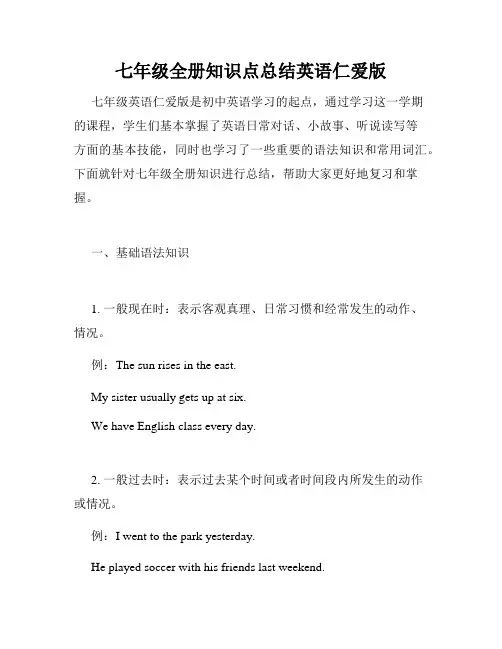
七年级全册知识点总结英语仁爱版七年级英语仁爱版是初中英语学习的起点,通过学习这一学期的课程,学生们基本掌握了英语日常对话、小故事、听说读写等方面的基本技能,同时也学习了一些重要的语法知识和常用词汇。
下面就针对七年级全册知识进行总结,帮助大家更好地复习和掌握。
一、基础语法知识1. 一般现在时:表示客观真理、日常习惯和经常发生的动作、情况。
例:The sun rises in the east.My sister usually gets up at six.We have English class every day.2. 一般过去时:表示过去某个时间或者时间段内所发生的动作或情况。
例:I went to the park yesterday.He played soccer with his friends last weekend.I studied math for two hours last night.3. 一般将来时:表示将来将要发生的动作或情况。
例:I will go to London next year.She is going to watch a movie this weekend.They won’t have a party tomorrow.4. 现在进行时:表示正在进行的动作或情况。
例:I'm listening to music now.She is reading a novel at the moment.They are talking on the phone.二、常用日常用语和表达1. 问候语:hello, hi, good morning/afternoon/evening, how are you, what's up, long time no see等。
例:Hi, Jack. How are you?Good morning, Mrs. Green. Nice to see you again.Long time no see. How have you been?2. 介绍和自我介绍: My name is..., Nice to meet you, How do you do, This is..., It's my pleasure to meet you等。
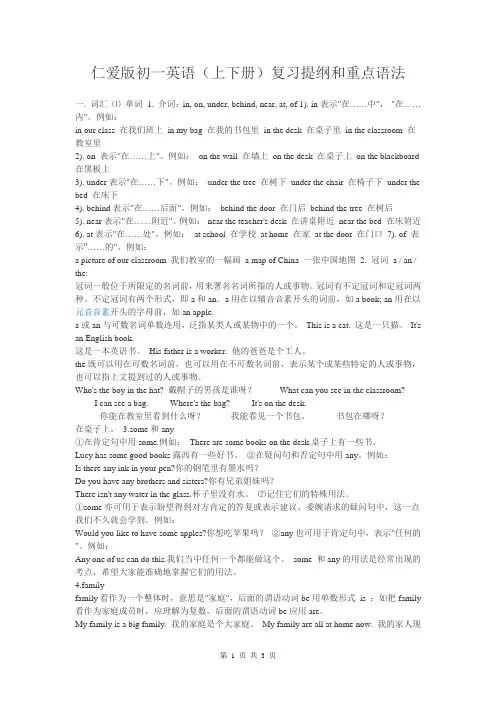
仁爱版初一英语(上下册)复习提纲和重点语法一. 词汇⑴单词 1. 介词:in, on, under, behind, near, at, of 1). in表示"在……中","在……内"。
例如:in our class 在我们班上in my bag 在我的书包里in the desk 在桌子里in the classroom 在教室里2). on 表示"在……上"。
例如:on the wall 在墙上on the desk 在桌子上on the blackboard 在黑板上3). under表示"在……下"。
例如:under the tree 在树下under the chair 在椅子下under the bed 在床下4). behind表示"在……后面"。
例如:behind the door 在门后behind the tree 在树后5). near表示"在……附近"。
例如:near the teacher's desk 在讲桌附近near the bed 在床附近6). at表示"在……处"。
例如:at school 在学校at home 在家at the door 在门口7). of 表示"……的"。
例如:a picture of our classroom 我们教室的一幅画a map of China 一张中国地图2. 冠词a / an / the:冠词一般位于所限定的名词前,用来署名名词所指的人或事物。
冠词有不定冠词和定冠词两种。
不定冠词有两个形式,即a和an。
a用在以辅音音素开头的词前,如a book; an用在以元音音素开头的字母前,如an apple.a或an与可数名词单数连用,泛指某类人或某物中的一个。
This is a cat. 这是一只猫。
新版仁爱英语七年级上册知识点归纳一、字母与音标。
1. 26个英文字母的大小写书写及读音。
- 大写字母:A - Z;小写字母:a - z。
注意字母的占格、笔画顺序等。
- 元音字母:a, e, i, o, u,它们在单词中的发音比较特殊。
2. 音标。
- 音标是记录音素的符号,是音素的标写符号。
- 例如:/ɑ:/(car中的a音),/ɔ:/(dog中的o音),/u:/(blue中的u 音)等。
- 要学会区分长元音和短元音,如/ɑ:/与/ʌ/,/u:/与/ʊ/等。
二、词汇。
1. 重点单词。
- 打招呼类。
- hello(你好),hi(嗨),good morning(早上好),good afternoon(下午好),good evening(晚上好),good night(晚安)。
- 人物称呼类。
- mom(妈妈),dad(爸爸),teacher(教师),student(学生),boy(男孩),girl(女孩),friend(朋友)。
- 数字类。
- one,two,three,four,five,six(6),seven(7),eight(8),nine (9),ten(10)。
- 颜色类。
- red(红色),blue(蓝色),green(绿色),yellow(黄色),black(黑色),white(白色)。
- 文具类。
- pen(钢笔),pencil(铅笔),ruler(尺子),eraser(橡皮擦),book (书),notebook(笔记本)。
2. 单词的复数形式。
- 一般情况加 -s,如book - books,pen - pens。
- 以s, x, ch, sh结尾的加 -es,如box - boxes,bus - buses。
- 以辅音字母+y结尾的,变y为i加 -es,如baby - babies。
- 不规则复数形式,如man - men,woman - women,child - children。
仁爱英语初中七年级知识点归纳本文档将对仁爱英语初中七年级的知识点进行归纳和总结。
1. 语法知识点初中七年级的语法知识点主要包括以下内容:- 名词:包括可数名词和不可数名词的用法及其复数形式。
- 代词:人称代词、物主代词、反身代词等的用法和变化形式。
- 动词:be动词的基本用法、一般现在时和一般过去时的动词变化规则。
- 形容词和副词:基本形容词和副词的用法以及比较级和最高级的形式变化。
- 介词:常用介词的用法以及其与动词、名词等的搭配。
2. 词汇知识点初中七年级的词汇知识点包括以下内容:- 基本词汇:介绍一些常见的英语单词及其词义和用法。
- 日常用语:介绍一些常用的日常用语及其表达方式。
- 动词短语:介绍一些常用的动词短语及其在句子中的用法。
3. 句型知识点初中七年级的句型知识点包括以下内容:- 简单句:介绍简单句的基本结构、肯定句、否定句和疑问句的构成方式。
- 并列句:介绍并列句的组成方式及其使用场景。
- 定语从句:介绍定语从句的用法和关系代词的使用。
- 状语从句:介绍状语从句的引导词及其在句子中的位置和作用。
4. 阅读技巧初中七年级的阅读技巧包括以下内容:- 预测:根据标题、插图或段落首句等,预测文章的主题或发展方向。
- 掌握重点信息:通过阅读文章并标记关键信息,提高对文章内容的理解。
- 推断:根据文章中的暗示或线索,进行合理的推理和推断。
- 猜测词义:通过上下文的提示,猜测生词的词义。
以上是对仁爱英语初中七年级的知识点进行的简要归纳和总结,希望对同学们的学习有所帮助。
请同学们根据自己的实际学习情况,按计划有针对性地复习和掌握这些知识点。
如有任何问题,请随时向老师请教。
七年级上册Unit 1 Making New FriendsTopic 1 Welcome to China!重点:1. 字母(1)26个英语字母的大小写形式(2)5个元音字母:Aa Ee Ii Oo Uu2. 交际英语(1)—Good morning! —Good afternoon!—Good evening!—Good night!—Good morning! —Good afternoon!—Good evening!—Good night!早上好!下午好!晚上好!晚安!(2)Thank you.=Thanks.谢谢。
(3)—Hello/Hi!—Hello/Hi!你好!(4)—How do you do ?—How do you do ?你好!(初次见面)(5)—How are you ? 你好!—I`m fine(OK),thank you (thanks).我很好,谢谢!(6)—Nice to meet /see you.见到你很高兴。
—Nice to meet/see you,too。
见到你也很高兴。
(7)—See you later.再见。
—Good bye.再见。
—See you. —Good bye./Bye-bye.?/Bye.3. 短语(1)welcome to 欢迎到…..4. 句型(1)—I am Kangkang.Are you Michael?我是康康。
你是迈克尔吗?—Yes,I am.是的,我是。
/No,I`m not.不,我不是。
(2)This is Michael. 这是迈克尔。
This is Miss Wang. 这是王老师。
This is +人/物用来给对方介绍人或者物等。
5. 语法Be动词I用am, You用are,is跟着他她它;单数用is,复数就用are;变疑问,提前它;变否定,更容易,be后not加上去;疑问否定任你变,句首大写莫忘记,句末问号莫忘记。
一、代词(pronouns)而名词性物主代词(mine/yours/his/hers/its/ours/theirs则相单于形容词性物主代词+名词,故其后不必加名词。
如:Eg: 1)这是你的书吗?是的,它是我的。
2)那些衣服是你们的吗?不,不是。
那是他们的。
They are their clothes/theirs.三、指示代词指示代词是用来指示或表示人或事物的词单数this,that,it,复数these,those1. 在句中起名词作用,作主语、宾语、表语;也可起形容词作用,作定语。
Eg: 1)这是一个苹果,那是一个橘子。
()2这些包非常重。
(These bags are very heavy.)2.指示代词在作主语时可指物也可指人,但作其他句子成分时只能指物,不能指人,Eg: 1)那是我的老师。
()2)我要这个。
(I want this. )和these一般用来指在时间或空间上较近的事物或人,that和those则指时间和空间上较远的事物或人.Eg:1)我要这个,而不是那个。
()2)这是一支钢笔,那是一只铅笔。
()4. 有时that和those指前面讲到过的事物,this 和these则是指下面将要讲到的事物.Eg: 1)他昨天病了,听到这个消息我很抱歉.( be ill I'm sorry to hear that. )2)告诉孩子们这样去做:把画张贴在墙上。
(Tell the children to do like this... )5. 有时为了避免重复提到的名词,常可用that 指代前文同类的不可数名词,those代替前文同类的复数可数名词。
用the one 指代与前文同类的单数可数名词。
例如:Television sets made in Beijing are just as good as those made in Shanghai.Eg:1)这些盒子比那些放在桌子上的更重。
()2)中国的人口比日本的更多。
()3)北京夏天的天气比上海的更凉爽。
()6. this 在电话用语中代表自己,that 则代表对方。
例如:Eg: 你好!我是玛利亚。
是杰克接电话吗?()7. it 指人时也可作为指示代词看待。
Who is it? It’s me.Oh,It’s you, Zhang Ling.人称代词物主代词练习题一、用适当的人称代词填空:1. __________ is my aunt. We often visit __________. ( she )2. China is a developing country. _________is in the east of Asia. ( its )3. I own a blue bike. The red one isn’t __________. ( I )4. These new houses are so nice. __________ are very expensive.( them )5. The fishermen caught a lot of fish, did n’t __________? ( them )6. Ling Ling is a girl. ____ studies in a primary school. ______ brother lives with ____ and helps ____ with______ lessons. ( she )7. Mike is my classmate. ____ is good at English . ( his )8. Kate wants a glass of milk. Will you pass it to ____ ? ( she )9. What’s the weather like today ? ____ is cloudy. ( its )二、用形容词性物主代词和名词性物主代词填空1. I ate all ____ sandwiches yesterday.( I ) Can I have one of ____ ? ( you )2. George has lost ____ ( his ) pen. Ask Mary if(是否)she will lend him ____ . ( she )3. Jack has a dog and so have I. ____ ( he ) dog and ____ ( I ) had a fight (打架).4. The teacher wants you to return that book of ____ ( he )5. Mr. and Mrs. Green and a friend of ____ are coming to see us. ( they )6. We are going to Paris to stay with a French friend of ____ . (we )三、用适当的人称代词和物主代词填空A. 从括号内选择正确的代词填空1. Your football clothes are on the desk. Please put _________(they,them,their,theirs) away.2. (We,Us,Our,Ours)____ English teacher is Mrs. Green. We all like _____(she,her,hers).3. (I,Me,My,Mine)______ can’t get my kite. Could you help ______(I,me,my,mine)?4. Tom can’t get down from the tree.Can you help _________(he,him,his)?5. These are _________(he,him,his) planes. The white ones are _________(I,me,mine).We can’t find our bikes. Can you help _________(we,us,our,ours)?B. 填入正确的人称代词和物主代词1. This isn’t________knife. _________ is green. ( she )2. These are your books,Kate. Put __________ in the desk,please. (they )3. _______ must look after ________ things. ( you )4. Wei Fang,is that ________ ruler? Yes,it’s.( you )5. They want a football. Give __________ the green one,please. ( they)6. It’s Lin Tao’s bag. Give it to __________. ( he )7. Is this pencil-box Li Lei’s? No,___________ is very new. ( he )8. This box is too heavy. I can’t carry _________. ( it )Don’t worry,Let __________( I ) help __________. ( you)9. _____ is a boy _____ name is Mike. Mike’s friends like _____ very much. ( he )10. My sister is in _____ room. _____ is a teacher. ( she )11. Jane is a little girl. _____ mother is a nurse. ( she )12. We are in _____ classroom. _____ classroom is big. ( we)13. My father and mother are teachers. _____ are busy ( them)14. You are a pupil. Is _____ brother a pupil, too? ( you )四、用括号中的适当形式填空(1)Are these ________(you)pencils? Yes, they are ________(our).(2)—Whose is this pencil? —It’s ________(I).(3)I love ________(they)very much.(4)She is________(I)classmate.(5)Miss Li often looks after________(she)brother.(6)—Are these ________(they)bags ?—No, they aren’t ________(their). They are ________(we).五、根据句意用适当的人称代词、物主代词填空:1. Mary works in a book store. _____ likes ______work very much.2. John and I are in the same school. ______ go to school together.3. Everybody likes that sport, do ______?4. She is a friend of _______ . We got to know each other two years ago.5. Her sister makes all ______ own dresses.6. I have many friends. Some of_______are good at English.7. May I use ______ bike? ______is broken.六、选择填空1. Who’s singing over there ? — ________ is Sandy’s sister.A. ThatB. ItC. SheD. This2. ________ will spend the summer holiday in Hawaii.A. She, you and IB. You, she and IC. I, you and sheD. Her, me and you3. My uncle bought a new bike for ________.A. theirsB. theyC. meD. I4. Here’s a postcard for you, Jim! — Oh, ________ is from my friend, Mary.A. heB. itC. sheD. it’s5. Little Baby knows that he should not take the things that do not belong to ____.A. heB. hisC. herD. him6. Is she your aunt? Yes, __________.A. she’sB. her isC. she isD. he is7. Are __________ coats yours? Yes, they are .A. theyB. theseC. thisD. there8. Is that __________ uncle? No, it isn’tA. heB. sheC. herD. hers9. Will anyone go on a trip with him ? — Not ________.A. IB. meC. mineD. he10. Among those lovely toys, the brown toy dog was given by ________.A. heB. hisC. himD. he’s二、一般现在时一、概念:1、表示现在的状态。